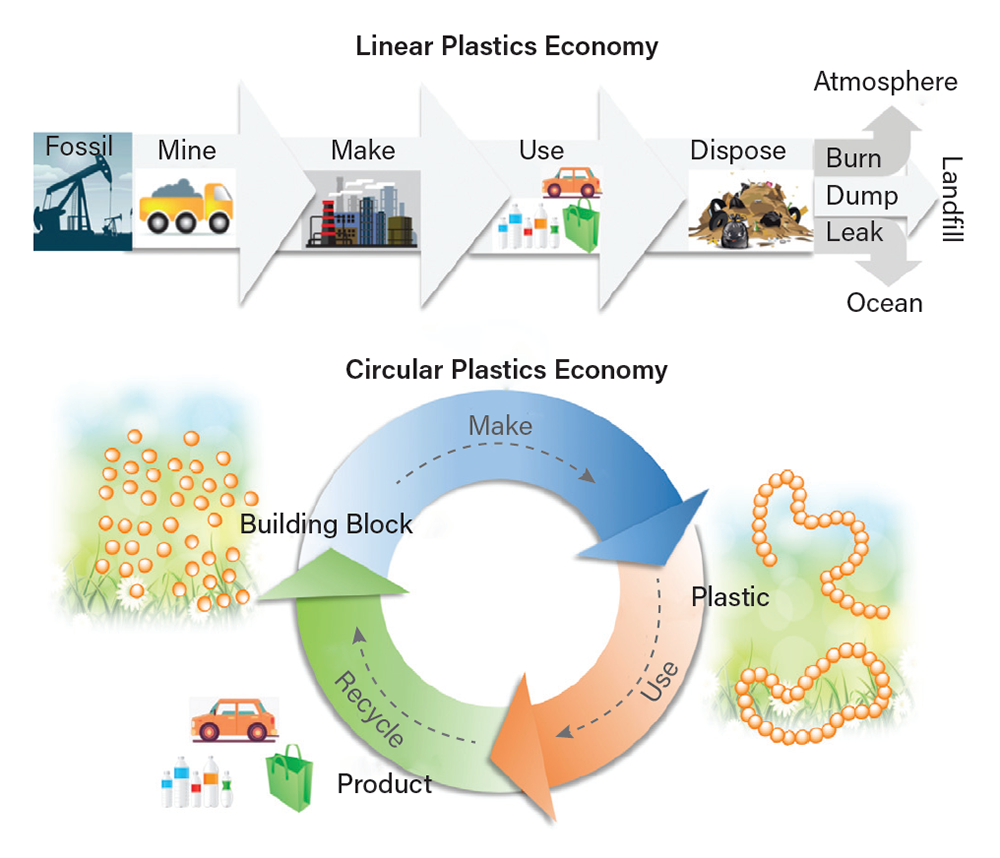Finding solutions to the plastic waste problem will require public-private partnerships, innovation in deconstruction and upcycling technologies, and the invention of new recyclable-by-design materials.
Plastics have revolutionized modern life, but our reliance on these inherently nondegradable materials is causing a global pollution crisis (1). Plastics manufacturing is predicted to account for 20% of global petroleum consumption in 2050, contributing substantially to greenhouse gas (GHG) emissions and carbon pollution (2). Of the nearly 5 billion m.t. of plastics that have been discarded across the globe in the past decades, only 600 million m.t. have been recycled. Research and development (R&D) into new technologies is required to mitigate this problem and protect the environment from further harm.
To address these problems, and as part of the U.S. Dept. of Energy’s (DOE’s) Plastics Innovation Challenge, the National Renewable Energy Laboratory (NREL) is leading a new public-private partnership called the BOTTLE Consortium — short for Bio-Optimized Technologies to keep Thermoplastics out of Landfills and the Environment. The consortium was created to find solutions to the plastic waste problem and to enable the transition to a circular economy for polymers (Figure 1) (3).

▲Figure 1. Single-use plastic products must be phased out to transition from a linear economy to a circular economy.
Supported by the DOE’s Bioenergy Technologies Office and Advanced Manufacturing Office, BOTTLE comprises industry and university members, government research laboratories, and other public and private agencies. The consortium’s science leadership team consists of leading researchers from academia and national laboratories, including Eugene Chen (Colorado State Univ.), Yuriy Román-Leshkov (Massachusetts Institute of Technology), Jennifer DuBois (Montana State Univ.), Linda Broadbelt (Northwestern Univ.), John McGeehan (Univ. of Portsmouth), Meltem Urgun-Demirtas (Argonne National Laboratory), Taraka Dale (Los Alamos National Laboratory), Gregg Beckham (NREL), Adam Guss (Oak Ridge National Laboratory), and Chris Tassone (Stanford Linear Accelerator Laboratory).
BOTTLE’s vision is to deliver selective, scalable technologies that enable cost-effective recycling and upcycling with high energy efficiencies. The mission is to develop robust processes to upcycle existing waste plastics and develop new, biobased plastics that are recyclable-by-design (RBD). To fulfill this vision and mission...
Would you like to access the complete CEP Article?
No problem. You just have to complete the following steps.
You have completed 0 of 2 steps.
-
Log in
You must be logged in to view this content. Log in now.
-
AIChE Membership
You must be an AIChE member to view this article. Join now.
Copyright Permissions
Would you like to reuse content from CEP Magazine? It’s easy to request permission to reuse content. Simply click here to connect instantly to licensing services, where you can choose from a list of options regarding how you would like to reuse the desired content and complete the transaction.
